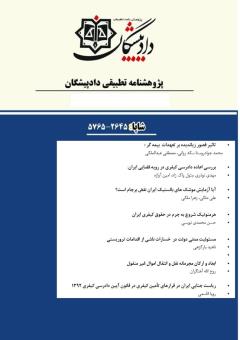Iran's criminal policy in criminal security agreements in the Criminal Procedure Code of 1392
Subject Areas : حقوق جزا و جرمشناسی
1 -
Keywords: Criminal policy, criminal security agreements, criminal procedure,
Abstract :
Judicial authorities of the prosecutor's office play an important role in the formation and formation of criminal cases, and failure to comply with the requirements of a fair trial at various stages of the criminal process, especially the preliminary investigation stage, can lead the trial to an unfair decision. Accordingly, the old position of the prosecutor's office has changed from two hundred years ago to the present day, and a great change has taken place in the new criminal policy in this regard. Thinkers' views on criminal policy are consistent, and without a rational criminal policy, there can be no answer. Iran's criminal policy is often repressive and coercive against criminals, and Iran's legislative policy is dichotomous, and sometimes legislative and judicial criminal policy are in conflict. The necessity of criminologies cannot be denied, but the anticipation of temporary punishments such as long-term detention and even non-departure from the judiciary, etc., is partly due to ignoring the teachings of criminology and criminal sociology. Judges are often hesitant to apply such punishments to avoid the consequences of criminal misconduct. Crime prevention is the most effective part of criminal policy, but prevention is not considered very important in Iranian law, and coercive politics is currently facing a serious challenge.
فهرست منابع و مأخذ :
1. منابع فارسی:
الف) کتب:
1. اباذري فومشي، منصور، نحوه عملي تنظيم و نگارش انواع قرار و دستورات قضايي، چاپ اول، تهران،1384.
2. تدین، عباس، قانون آئین دادرسی کیفری فرانسه، چاپ اول، روزنامه رسمی جمهوری اسلامی ایران،تهران، 1388.
3. جعفری لنگرودی، محمدجعفر، ترمینولوژِی حقوق، چاپ بیست و هشتم، انتشارات گنج دانش، تهران، 1394.
4. جوانمرد، بهروز، آیین دادرسی کیفری، جلد 1، انتشارات جاودانه، تهران،1394.
5. دهخدا، علیاکبر، لغتنامه دهخدا، جلد 4، انتشارات دانشگاه تهران، تهران، 1372.
6. زراعت، عباس، آئین دادرسی کیفری ایران با تکیه بر اصول و قواعد، چاپ اول، نشر دانشپذیر، تهران،1388.
7. عمید، حسن، فرهنگ عمید، جلد اول، انتشارات امیرکبیر، تهران، 1386.
8. معین، محمد، فرهنگ فارسی معین، جلد 1، چاپ دوم، انتشارات ساحل، تهران، 1383.
9. ب) مقالات
10. آشوری، محمد، نگاهی به حقوق دفاعی متهم در حقوق اساسی و قانون آئین دادرسی دادگاههای عمومی و انقلاب در امور کیفری، مجله مجتمع آموزش عالی قم، دوره 3، ش 3، 1387.
11. ساقیان، محمدمهدي، «تقویت حقوق و آزادیهای متهم در مرحله تحقیقات مقدماتی آیین دادرسی کیفري مصوب 1392»، پژوهش حقوق کیفري، شماره ششم، سال دوم، بهار 1393.
12. صادقی، احمدرضا، مقدمهای بر مفهوم سياست جنايي، ماهنامه عدالت، سال دوازدهم، شماره 90.
13. نجفی ابرندآبادی، علی حسین، «سياست جنايي»، مجله تحقيقات حقوقي، انتشارات دانشکده حقوق دانشگاه شهيد بهشتي، ش 11 و 12.
2. منابع لاتین:
14. استفانی، گاستون، لوا سور ژرژ، بولوک، برنارد، آئین دادرسی کیفری، جلد دوم،چاپ اول؛ مترجم:دکترحسن دادبان، نشردانشگاه علامه طباطبایی،تهران، 1377.
15. لازرژ، کرستين، درآمدي به سياست جنايي، ترجمه: علي حسين نجفي ابرندآبادی، انتشارات ميزان، تهران، 1382.
16. مارتی، دلماس، نظامهاي بزرگ سياست جنايي، مترجم:علي حسين نجفي ابرند آبادي،جلد 1، نشرميزان،تهران، 1381.
3. منابع عربی:
17. محمد ظاهر، معروف، المبادی الادلّه فی اصول الاجراءات الجنائیة، بغداد، دارالطبع و النشر الاهلیه،1972.


